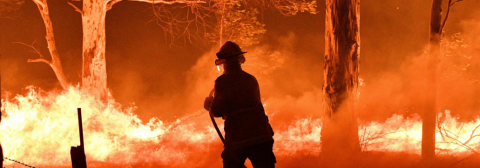Earlier this month WSAA members joined a webinar from Canadian research organisation forWater on the value of long term monitoring linked to long term impacts for managing bushfires. Jason Mingo, our Manager of Environment and Technology Research shares some key insights.

The webinar gave WSAA members the opportunity to hear about some of the world’s leading research on understanding responses and impacts from bushfires on watersheds, water quality and treatability. Building on nearly two decades worth of research experience in understanding the ever changing dynamics and impacts of bushfires, the speakers from forWater, shared insight into the understanding of long term impacts and the value of long term monitoring for better proactive management and response.
Some of the key points from the webinar included the demonstration of the long term impacts experienced from severe bushfires within catchments, highlighting the importance of monitoring to better understand the changing dynamics and to allow for more effective response following such events. Highlights included:
- Understanding and appreciating the linkages between catchment management and treatability of water for quality of supply is key to ensuring resilience.
- Key variables that are most likely to change in source water quality to pose a risk to water treatment include dissolved organic carbon, turbidity and phosphorous.
- The management of raw water storages can both mitigate and threaten raw water quality and treatability with effective fine sediment management being a critical element to ensure successful mitigation.
- Long term monitoring is critical to understand the fluctuating nature of bushfire impacts, as these may be long lasting.
- An understanding of the limitation of current infrastructure is important in the planning for effective responses and mitigation with the required investment in infrastructure, operations and training to build resilience.
Water Research Australia also joined the webinar and presented an overview of current Australian projects, and responses received during their catchment forum on research gaps and needs. The opportunity for a coordinated and collaborative approach to support future research in this field is currently being explored between WSAA, WaterRA and the forWater research team, with support from the Canadian Water Network. Our members will be kept updated on the progress.noting the need to link with existing and broader efforts such as those within the Bushfire and Natural Hazards CRC amongst others.
For more information on the webinar recording and presentations please contact Jason Mingo, Manager Environment and Technology Research.
